July 2024
Heel Pain Can Be Treated!
A Step-by-Step Approach for Foot Wound Care
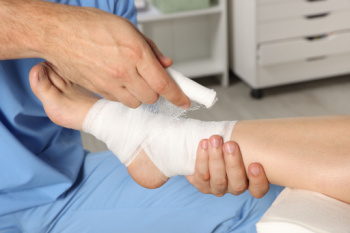
Caring for foot wounds involves a systematic approach to promote healing and prevent complications. Start by cleaning the wound gently with mild soap and lukewarm water, avoiding harsh scrubbing to prevent further damage. Rinse thoroughly and pat dry with a clean, soft cloth. Apply an antibiotic ointment to protect against infection and cover the wound with a sterile dressing or bandage. Change dressings daily or as instructed by a podiatrist to keep the wound clean and monitor healing progress. Elevate the injured foot when possible to reduce swelling and improve blood flow. Avoid putting weight on the wound and wear appropriate footwear to minimize pressure and friction. Additionally, regularly inspect the wound for signs of infection such as increased pain, redness, or pus, and seek prompt medical attention from a podiatrist if these symptoms occur. If you have developed a wound on your foot, it is strongly suggested that you schedule an appointment with this type of doctor.
Wound care is an important part in dealing with diabetes. If you have diabetes and a foot wound or would like more information about wound care for diabetics, consult with one of our podiatrists from Coastal Foot & Ankle Wellness Center, LLC. Our doctors will assess your condition and provide you with quality foot and ankle treatment.
What Is Wound Care?
Wound care is the practice of taking proper care of a wound. This can range from the smallest to the largest of wounds. While everyone can benefit from proper wound care, it is much more important for diabetics. Diabetics often suffer from poor blood circulation which causes wounds to heal much slower than they would in a non-diabetic.
What Is the Importance of Wound Care?
While it may not seem apparent with small ulcers on the foot, for diabetics, any size ulcer can become infected. Diabetics often also suffer from neuropathy, or nerve loss. This means they might not even feel when they have an ulcer on their foot. If the wound becomes severely infected, amputation may be necessary. Therefore, it is of the upmost importance to properly care for any and all foot wounds.
How to Care for Wounds
The best way to care for foot wounds is to prevent them. For diabetics, this means daily inspections of the feet for any signs of abnormalities or ulcers. It is also recommended to see a podiatrist several times a year for a foot inspection. If you do have an ulcer, run the wound under water to clear dirt from the wound; then apply antibiotic ointment to the wound and cover with a bandage. Bandages should be changed daily and keeping pressure off the wound is smart. It is advised to see a podiatrist, who can keep an eye on it.
If you have any questions, please feel free to contact one of our offices located in St. Augustine, and Palatka, FL . We offer the newest diagnostic and treatment technologies for all your foot care needs.
How to Identify and Treat a Foot Corn
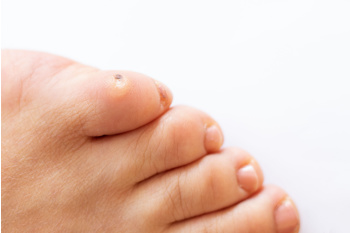
Corns, those pesky patches of thickened skin, can turn a simple walk into agony. Identifying them is key. Look for hardened areas on toes or feet, often with a cone-like shape pointing inward. They are caused by friction and pressure, typically from wearing ill-fitting shoes or repetitive actions. Treating corns involves gentle methods like soaking the feet in warm water, using a pumice stone to smooth the area, and moisturizing to prevent recurrence. Avoid over-the-counter corn removal products, as they can damage healthy skin. For persistent corns, or if you are unsure about treatment, it is wise to seek advice from a podiatrist. They can provide professional care, assess your foot health, and recommend appropriate courses of action. Do not let corns slow you down. It is suggested that you schedule an appointment with a podiatrist for personalized guidance and relief.
Corns can make walking very painful and should be treated immediately. If you have questions regarding your feet and ankles, contact one of our podiatrists of Coastal Foot & Ankle Wellness Center, LLC. Our doctors will treat your foot and ankle needs.
Corns: What Are They? And How Do You Get Rid of Them?
Corns are thickened areas on the skin that can become painful. They are caused by excessive pressure and friction on the skin. Corns press into the deeper layers of the skin and are usually round in shape.
Ways to Prevent Corns
There are many ways to get rid of painful corns such as:
- Wearing properly fitting shoes that have been measured by a professional
- Wearing shoes that are not sharply pointed or have high heels
- Wearing only shoes that offer support
Treating Corns
Although most corns slowly disappear when the friction or pressure stops, this isn’t always the case. Consult with your podiatrist to determine the best treatment option for your case of corns.
If you have any questions please feel free to contact one of our offices located in St. Augustine, and Palatka, FL . We offer the newest diagnostic and treatment technologies for all your foot and ankle needs.
Stages of Children's Feet From Pre-Crawling to School
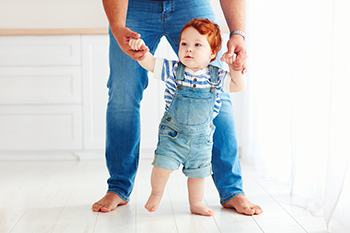
Children's feet go through various stages of development, each requiring specific care and attention. During the pre-crawling stage, infants have soft, pliable feet that need freedom to move and grow, so bare feet or socks are ideal. For newborns, shoes are not necessary, but soft, flexible booties can provide warmth. As babies start taking their first steps, known as the first walker stage, they need lightweight, flexible shoes that allow natural foot movement and provide protection. In preschool, children become more active, necessitating sturdy shoes that offer support and durability. By the time they reach school age, kids' feet have developed arches and require well-fitting shoes that support prolonged periods of walking and running. If you have questions regarding your child’s foot development, it is suggested that you consult a podiatrist who can address any concerns you may have.
Making sure that your children maintain good foot health is very important as they grow. If you have any questions, contact one of our podiatrists of Coastal Foot & Ankle Wellness Center, LLC. Our doctors can provide the care you need to keep you pain-free and on your feet.
Keeping Children's Feet Healthy
Having healthy feet during childhood can help prevent medical problems later in life, namely in the back and legs. As children grow, their feet require different types of care. Here are some things to consider...
Although babies do not walk yet, it is still very important to take care of their feet.
Avoid putting tight shoes or socks on his or her feet.
Allow the baby to stretch and kick his or her feet to feel comfortable.
As a toddler, kids are now on the move and begin to develop differently. At this age, toddlers are getting a feel for walking, so don’t be alarmed if your toddler is unsteady or ‘walks funny’.
As your child gets older, it is important to teach them how to take care of their feet.
Show them proper hygiene to prevent infections such as fungus.
Be watchful for any pain or injury.
Have all injuries checked by a doctor as soon as possible.
Comfortable, protective shoes should always be worn, especially at play.
If you have any questions please feel free to contact one of our offices located in St. Augustine, and Palatka, FL . We offer the newest diagnostic and treatment technologies for all your foot and ankle needs.
Types of Sandals That Harm Your Feet
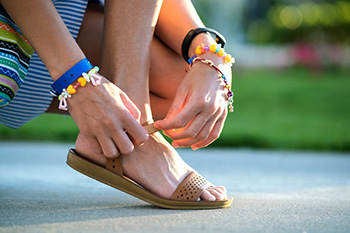
Sandals are a go-to choice for many, especially during the summer, but they can often do more harm than good to your feet. Many sandals lack the necessary support and cushioning, leading to various foot ailments. Flat flip-flops and thin-soled sandals, for instance, provide minimal arch support, which can strain the plantar fascia and cause heel pain. Thong sandals require a gripping action that can lead to toe deformities like hammertoes. Slide sandals, often non-adjustable, can cause blisters and foot fatigue due to their instability. Flat gladiator sandals may look great but typically offer poor arch support and can create painful pressure points. Soleless or minimalist sandals, with little to no cushioning, increase the impact on your feet and joints, leading to fatigue and potential injuries. Sandals with inadequate strapping can cause friction, resulting in blisters and calluses. These types of sandals not only cause immediate discomfort but can also contribute to more serious conditions like bunions and Morton’s neuroma. If you have foot pain after wearing sandals, it is suggested that you make an appointment with a podiatrist for an exam and treatment options.
Everyday foot care is very important to prevent infection and other foot ailments. If you need your feet checked, contact one of our podiatrists from Coastal Foot & Ankle Wellness Center, LLC. Our doctors can provide the care you need to keep you pain-free and on your feet.
Everyday Foot Care
Often, people take care of their bodies, face and hair more so than they do for their feet. But the feet are a very important aspect of our bodies, and one that we should pay more attention to. Without our feet, we would not be able to perform most daily tasks.
It is best to check your feet regularly to make sure there are no new bruises or cuts that you may not have noticed before. For dry feet, moisturizer can easily be a remedy and can be applied as often as necessary to the affected areas. Wearing shoes that fit well can also help you maintain good foot health, as well as making it easier to walk and do daily activities without the stress or pain of ill-fitting shoes, high heels, or even flip flops. Wearing clean socks with closed shoes is important to ensure that sweat and bacteria do not accumulate within the shoe. Clean socks help to prevent Athlete’s foot, fungi problems, bad odors, and can absorb sweat.
If you have any questions please feel free to contact one of our offices located in St. Augustine, and Palatka, FL . We offer the newest diagnostic and treatment technologies for all your foot and ankle needs.
Preventing Falls in Older People
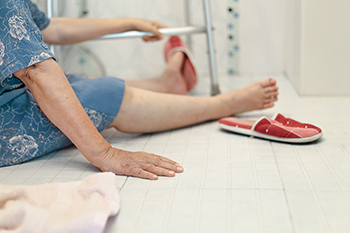 Falls are a significant concern for older adults, often resulting in serious injuries and decreased independence. Factors contributing to falls can include poor balance, muscle weakness, and foot problems such as neuropathy, arthritis, or wearing improperly fitted footwear. As we age, changes in vision and the side effects of medications can also increase the risk of falling. Preventing falls requires a proactive approach focusing on foot health. Older adults should regularly check their feet for any abnormalities and wear shoes that provide adequate support and have non-slip soles. Keeping floors clear of clutter, installing grab bars in bathrooms, and ensuring adequate lighting throughout the home can also help reduce fall risks. Engaging in regular physical activity, such as balance exercises and strength training, can improve stability and coordination. Additionally, reviewing medications with a healthcare provider can help identify those that may affect balance. If you are elderly and want to prevent the risk of falls and get help for any foot problems that might play a role, it is suggested that you visit a podiatrist regularly to maintain good foot health.
Falls are a significant concern for older adults, often resulting in serious injuries and decreased independence. Factors contributing to falls can include poor balance, muscle weakness, and foot problems such as neuropathy, arthritis, or wearing improperly fitted footwear. As we age, changes in vision and the side effects of medications can also increase the risk of falling. Preventing falls requires a proactive approach focusing on foot health. Older adults should regularly check their feet for any abnormalities and wear shoes that provide adequate support and have non-slip soles. Keeping floors clear of clutter, installing grab bars in bathrooms, and ensuring adequate lighting throughout the home can also help reduce fall risks. Engaging in regular physical activity, such as balance exercises and strength training, can improve stability and coordination. Additionally, reviewing medications with a healthcare provider can help identify those that may affect balance. If you are elderly and want to prevent the risk of falls and get help for any foot problems that might play a role, it is suggested that you visit a podiatrist regularly to maintain good foot health.
Preventing falls among the elderly is very important. If you are older and have fallen or fear that you are prone to falling, consult with one of our podiatrists from Coastal Foot & Ankle Wellness Center, LLC. Our doctors will assess your condition and provide you with quality advice and care.
Every 11 seconds, an elderly American is being treated in an emergency room for a fall related injury. Falls are the leading cause of head and hip injuries for those 65 and older. Due to decreases in strength, balance, senses, and lack of awareness, elderly persons are very susceptible to falling. Thankfully, there are a number of things older persons can do to prevent falls.
How to Prevent Falls
Some effective methods that older persons can do to prevent falls include:
- Enrolling in strength and balance exercise program to increase balance and strength
- Periodically having your sight and hearing checked
- Discuss any medications you have with a doctor to see if it increases the risk of falling
- Clearing the house of falling hazards and installing devices like grab bars and railings
- Utilizing a walker or cane
- Wearing shoes that provide good support and cushioning
- Talking to family members about falling and increasing awareness
Falling can be a traumatic and embarrassing experience for elderly persons; this can make them less willing to leave the house, and less willing to talk to someone about their fears of falling. Doing such things, however, will increase the likelihood of tripping or losing one’s balance. Knowing the causes of falling and how to prevent them is the best way to mitigate the risk of serious injury.
If you have any questions, please feel free to contact one of our offices located in St. Augustine, and Palatka, FL . We offer the newest diagnostic and treatment technologies for all your foot care needs.








